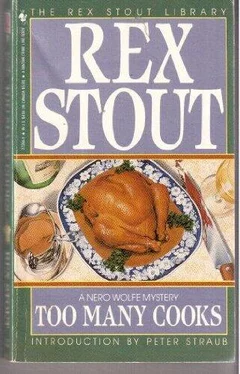Rex Stout - Too Many Cooks
Здесь есть возможность читать онлайн «Rex Stout - Too Many Cooks» весь текст электронной книги совершенно бесплатно (целиком полную версию без сокращений). В некоторых случаях можно слушать аудио, скачать через торрент в формате fb2 и присутствует краткое содержание. Жанр: Старинная литература, en-GB. Описание произведения, (предисловие) а так же отзывы посетителей доступны на портале библиотеки ЛибКат.
- Название:Too Many Cooks
- Автор:
- Жанр:
- Год:неизвестен
- ISBN:нет данных
- Рейтинг книги:4 / 5. Голосов: 1
-
Избранное:Добавить в избранное
- Отзывы:
-
Ваша оценка:
- 80
- 1
- 2
- 3
- 4
- 5
Too Many Cooks: краткое содержание, описание и аннотация
Предлагаем к чтению аннотацию, описание, краткое содержание или предисловие (зависит от того, что написал сам автор книги «Too Many Cooks»). Если вы не нашли необходимую информацию о книге — напишите в комментариях, мы постараемся отыскать её.
Too Many Cooks — читать онлайн бесплатно полную книгу (весь текст) целиком
Ниже представлен текст книги, разбитый по страницам. Система сохранения места последней прочитанной страницы, позволяет с удобством читать онлайн бесплатно книгу «Too Many Cooks», без необходимости каждый раз заново искать на чём Вы остановились. Поставьте закладку, и сможете в любой момент перейти на страницу, на которой закончили чтение.
Интервал:
Закладка:
“Yes. It seems to have come about through a wager between Mr. Servan and Mr. Keith. After the digestion of dinner there is to be a test. The cook will roast squabs, and Mr. Laszio, who volunteered for the function, will make a quantity of Sauce Printemps. That sauce contains nine seasonings, besides salt: cayenne, celery, shallots, chives, chervil, tarragon, peppercorn, thyme and parsley. Nine dishes of it will be prepared, and each will lack one of the seasonings, a different one. The squabs and sauce dishes will be arrayed in the dining room, and Mr. Laszio will preside. The gathering will be in the parlor, and each will go to the dining room, singly to prevent discussion, taste the sauces on bits of squab, and record which dish lacks chives, which peppercorn, and so on. I believe Mr. Servan has wagered on an average of eighty percent correct.”
“Well.” I yawned again. “I can pick the one that lacks squab.”
“You will not be included. Only the members of Les Quinze Maitres and myself. It will be an instructive and interesting experiment. The chief difficulty will be with chives and shallots, but I believe I can distinguish. I shall drink wine with dinner, and of course no sweet. But the possibility occurred to me of a connection between this affair and Mrs. Laszio’s strange report. Mr. Laszio is to make the sauce. You know I am not given to trepidation, but I came here to meet able men, not to see one or more of them murdered.”
“You came here to learn how to make sausage. But forget it; I guess that’s out. But how could there be a connection? It’s Laszio that’s going to get killed, isn’t it? The tasters are safe. Maybe you’d better go last. If you get sick out here in the jungle I will have a nice time.”
He shut his eyes. Soon he opened them again. “I don’t like stories about arsenic in food. What time is it?”
Too darned lazy to reach in his pocket. I told him, and he sighed and began preparations for getting himself upright.
The dinner at Pocahontas Pavilion that evening was elegant as to provender, but a little confused in other respects. The soup, by Louis Servan, looked like any consomme, but it wasn’t just any. He had spread himself, and it was nice to see his dignified old face get red with pleasure as they passed remarks to him. The fish, by Leon Blanc, was little six-inch brook trout, four to a customer, with a light brown sauce with capers in it, and a tang that didn’t seem to come from lemon or any vinegar I had ever heard of. I couldn’t place it, and Blanc just grinned at them when they demanded the combination, saying he hadn’t named it yet. All of them, except Lisette Putti and me, ate the trout head and bones and all, even Constanza Berin, who was on my right. She watched me picking away and smiled at me and said I would never make a gourmet, and I told her not eating fishes’ faces was a matter of sentiment with me on account of my pet goldfish. Watching her crunch those trout heads and bones with her pretty teeth, I was glad I had put the kibosh on my attack of leg-jealousy.
The entree, by Pierre Mondor, was of such a nature that I imitated some of the others and had two helpings. It appeared to be a famous creation of his, well-known to the others, and Constanza told me that her father made it very well and that the main ingredients were beef marrow, cracker crumbs, white wine and chicken breast. In the middle of my second portion I caught Wolfe’s eye across the table and winked at him, but he ignored me and hung on to solemn bliss. As far as he was concerned, we were in church, and Saint Peter was speaking. It was during the consumption of the entree that Mondor and his plump wife, without any warning, burst into a screaming argument which ended with him bouncing up and racing for the kitchen, and her hot on his tail. I learned afterward that she had heard him ask Lisette Putti if she liked the entree. She must have been abnormally moral for a Frenchwoman.
The roast was young duck a la Mr. Richards, by Marko Vukcic. This was one of Wolfe’s favorites and I was well acquainted with the Fritz Brenner-Nero Wolfe version of it, and by the time it arrived I was so nearly filled that I was in no condition to judge, but the other men took a healthy gulp of Burgundy for a capital letter to start the new paragraph, and waded in as if they had been waiting for some such little snack to take the edge off their appetite. I noticed that the best the women could do was peck, particularly Lio, Lawrence Coyne’s Chinese wife, and Dina Laszio. I also noticed that the greenjacket waiters were aware that they were looking on at a gastronomical World’s Series, though they were trying not to show it. Before it was over those birds disposed of nine ducks. It looked to me as if Vukcic was overdoing it a little on the various brands of wine, and maybe that was why he was so quick on the trigger when Phillip Laszio began making remarks about duck stuffings which he regarded as superior to Mr. Richards’ and proceeded from that to comments on the comparative discrimination of the clientele of the Hotel Churchill and Rusterman’s Restaurant. I had come as Vukcic’s guest, and anyway I liked him, and it was embarrassing to me when he hit Laszio square in the eye with a hunk of bread. The others seemed to resent it chiefly as an interruption, and Servan, next to Laszio, soothed him, and Vukcic glared at their remonstrances and drank more Burgundy, and a greenjacket retrieved the bread from the floor, and they went back to the duck.
The salad, by Domenico Rossi, was attended by something of an uproar. In the first place, Phillip Laszio left for the kitchen while it was being served and Rossi had feelings about that and continued to express them after Servan had explained that Laszio must attend to the preparation of the Sauce Printemps for the test that had been arranged. Rossi didn’t stop his remarks about sons-in-law twice his age. Then he noticed that Pierre Mondor wasn’t pretending to eat, and wanted to know if perchance he had discovered things crawling on the lettuce. Mondor replied, friendly but firm, that the juices necessary to impart a flavor to salads, especially vinegar, were notoriously bad companions for wine, and that he wished to finish his Burgundy.
Rossi said darkly, “There is no vinegar. I am not a barbarian.”
“I have not tasted it. I smell salad juice, that is why I pushed it away.”
“I tell you there is no vinegar! That salad is mostly by the good Cod, as He made things! Mustard sprouts, cress sprouts, lettuce! Onion juice with salt! Bread crusts rubbed with garlic! In Italy we eat it from bowls, with Chianti, and we thank God for it!”
Mondor shrugged. “In France we do not. France, as you well know, my dear Rossi, is supreme in these things. In what language-”
“Ha!” Rossi was on his hind legs. “Supreme because we taught you! Because in the sixteenth century you came and ate our food and copied us! Can you read? Do you know the history of gastronomy? Any history at all? Do you know that of all the good things in France, of which there are a certain number, the original is found in Italy? Do you know-”
I suppose that’s how the war will start. On that occasion it petered out. They kept Mondor from firing up and got Rossi started on his own salad, and we had peace.
Coffee was served in the two parlors. Two, because Lawrence Coyne got stretched out on the divan in the small one again, and Keith and Leon Blanc sat by him and talked. I’m always more comfortable on my feet after a meal, and I wandered around. Back in the large parlor, Wolfe and Vukcic and Berin and Mondor were in a group in a corner, discussing the duck. Mamma Mondor came waddling in from the hall with a bag of knitting and got settled under a light. Lio Coyne was on a big chair with her feet tucked under her, listening to Vallenko tell her stories. Lisette Putti was filling Servan’s coffee cup, and Rossi stood frowning at an Indian blanket thrown over a couch as if he suspected it was made in France.
Читать дальшеИнтервал:
Закладка:
Похожие книги на «Too Many Cooks»
Представляем Вашему вниманию похожие книги на «Too Many Cooks» списком для выбора. Мы отобрали схожую по названию и смыслу литературу в надежде предоставить читателям больше вариантов отыскать новые, интересные, ещё непрочитанные произведения.
Обсуждение, отзывы о книге «Too Many Cooks» и просто собственные мнения читателей. Оставьте ваши комментарии, напишите, что Вы думаете о произведении, его смысле или главных героях. Укажите что конкретно понравилось, а что нет, и почему Вы так считаете.












